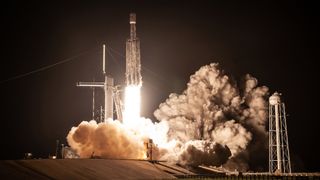
NASA's forthcoming dark matter-hunting telescope has a ride on a SpaceX rocket.
The Roman Space Telescope will launch no earlier than 2026 aboard a Falcon Heavy rocket from the California-based company, NASA announced (opens in new tab) Tuesday (July 19).
NASA will pay SpaceX $255 million for the launch service "and other mission-related costs," agency officials stated. The mission is slated to launch from Launch Complex 39A at NASA's Kennedy Space Center in Florida.While Falcon Heavy is a largely new rocket — it has only launched three times, most famously with a Tesla-riding mannequin on board in 2018 — it appears the agency wanted the extra fuel this rocket can carry, over SpaceX's lighter-lift Falcon 9 workhorse.
Roman, previously called the Wide Field Infrared Survey Telescope (WFIRST), boasts the same mirror size as the long-running Hubble Space Telescope. Unlike Hubble, however, Roman is optimized to look at fields of view 100 times larger. This makes the new observatory ideal for large-scale surveys of the universe.
Working in infrared light, Roman is scheduled to undertake investigations into dark energy and dark matter that are believed to make up much of the structure of the universe.
The telescope will also examine exoplanets using a technique called microlensing, examining subtle "warps" in space-time induced by planets circling their parent stars.
NASA has said wide-field the telescope will be a valuable surveyor of exoplanets to scout for worlds that Webb can see in higher-definition, and that are farther away from Earth than what the Transiting Exoplanet Survey Satellite (TESS) could pick up.
Follow Elizabeth Howell on Twitter @howellspace (opens in new tab). Follow us on Twitter @Spacedotcom (opens in new tab) or Facebook (opens in new tab).
Join our Space Forums to keep talking space on the latest missions, night sky and more! And if you have a news tip, correction or comment, let us know at: community@space.com.
Elizabeth Howell, Ph.D., is a staff writer in the spaceflight channel since 2022. She was contributing writer for Space.com (opens in new tab) for 10 years before that, since 2012. As a proud Trekkie and Canadian, she also tackles topics like diversity, science fiction, astronomy and gaming to help others explore the universe. Elizabeth's on-site reporting includes two human spaceflight launches from Kazakhstan, three space shuttle missions in Florida, and embedded reporting from a simulated Mars mission in Utah. She holds a Ph.D. and M.Sc. in Space Studies from the University of North Dakota, and a Bachelor of Journalism from Canada's Carleton University. Elizabeth is also a post-secondary instructor in communications and science since 2015. Her latest book, Leadership Moments from NASA, is co-written with astronaut Dave Williams. Elizabeth first got interested in space after watching the movie Apollo 13 in 1996, and still wants to be an astronaut someday.




No comments:
Post a Comment